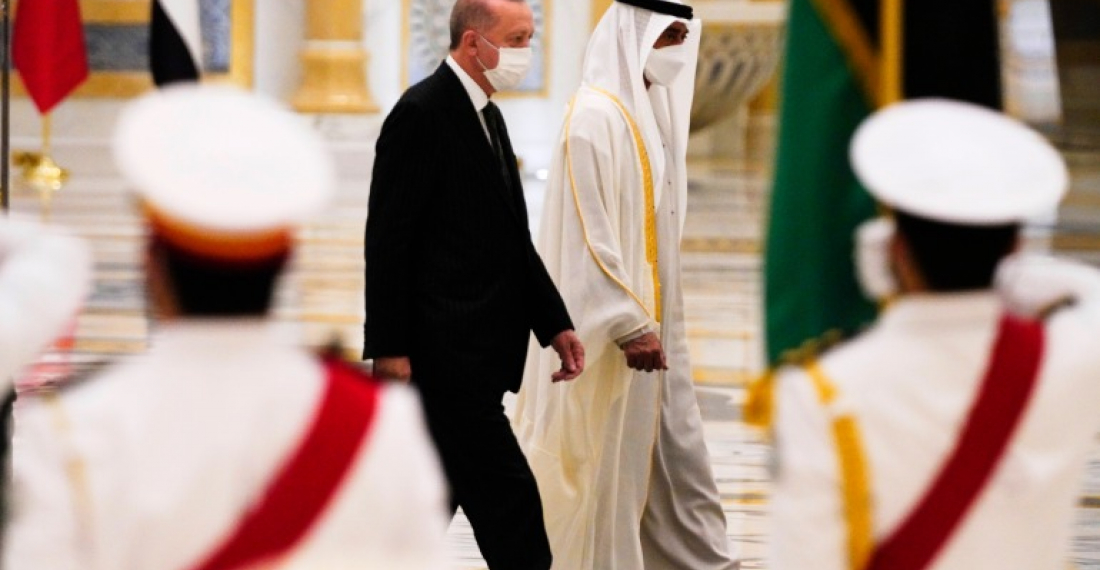The Turkish president, Recip Tayip Erdogan, on Monday started a historic two day visit to the United Arab Emirates (UAE), ending a decade long period of feuding that had turned the two countries into all but enemies.
Erdogan's visit seals a year long process of reconciliation, that also saw the UAE de facto leader, Crown Prince Mohammed bin Zayed, visiting Ankara last November. On both occasions the hosts laid out lavish welcome ceremonies, emphasising the importance they attached to the occasion.
Commonspace.eu political editor said that the new Turkey-UAE entente can become quickly a game changer in many settings across the Middle East and Africa, where the two had competed over the last decade as they pursued their respective policies. Both UAE and Turkey are now very active on the international scene, particularly in Africa and the Middle East. In places such as Somalia, Libya and Tunisia the two countries had backed opposing groups or factions. There is now the prospect of at least approximating positions, and avoiding escalation. Whilst Turkey is stronger as a military power - reflecting its much larger population, the UAE is a financial and economic giant. It appears that the two leaders are looking for synergies to see how they can play to each other's particular strengths.
Dialogue and cooperation between Turkey and the United Arab Emirates is important for the peace and stability of the entire region, Erdogan underlined prior to the trip.
"We do not consider the security and stability of all brotherly countries in the Gulf region separate from our own," he told a news conference at Ataturk Airport in Istanbul before departing on his first visit since recovering from COVID-19 after testing positive early February.
"We aim to improve the momentum to bring back our relations to the level they deserve. During my visit, we will take steps that will shape the next 50 years of our friendship and brotherhood with the UAE," he said.
Noting that he last visited the UAE in 2013, Erdoğan said the countries ushered in a new era in bilateral relations with Prince Mohammed bin Zayed's visit to Ankara last November.
"The complementary nature of the two economies points to a potential far beyond the current figures. The purpose of our visit is to quickly realize this potential," Erdogan said, adding that he believes Ankara and Abu Dhabi "will go a long way in this direction."
With the volume of trade approaching $8 billion (TL 108.55 billion), the UAE is among Turkey’s leading trading partners, he said.
"The UAE is the 10th largest market of the overseas contracting sector in Turkey," he said, noting that the UAE also makes "significant contributions to the dynamic investment environment" in Turkey.
"Turkish construction companies in the UAE have so far undertaken 141 projects worth $13 billion," he added.
Ahead of the president’s visit the Turkish flag and the phrase "hoş geldiniz," meaning "welcome" in Turkish, were projected onto the Burj Khalifa, the tallest building in the UAE.
During the visit, all aspects of bilateral relations will be discussed, including opportunities to enhance cooperation and regional and international developments. Erdogan is also expected to visit EXPO 2020 Dubai, where Turkey’s national day will be celebrated.
Erdogan and MBZ will attend a signing ceremony for a dozen agreements following one-on-one meetings between the delegations.
The agreements will cover an array of fields, including investment, defense, transportation, agriculture, health and media.
Ahead of the visit, a top foreign policy adviser to UAE President Sheikh Khalifa bin Zayed Al Nahyan on Sunday proclaimed that Erdogan's trip would turn a new page in bilateral relations.
The president travels with a huge delegation, signaling the importance placed on ties with the UAE, including Turkey’s foreign, interior, economy, trade, industry and technology, transportation, culture and tourism and agriculture ministers.
Erdogan's visit comes as the UAE faces a growing threat from Yemen's Iran-backed Houthi rebels, who in recent weeks have launched a series of drone and missile attacks on the Gulf country and prompted increased defense cooperation with the United States and France. It is indeed in the crafting of a common position towards Tehran that the two countries can put their new friendship to the test.
source: commonspace.eu with Daily Sabah (Ankara) and agencies
photo: Turkish president Recip Tayip Erdogan arrived in the United Arab Emirates on Monday (14 February) for talks with the country's leadership. (picture courtesy of Daily Sabah, Ankara).






